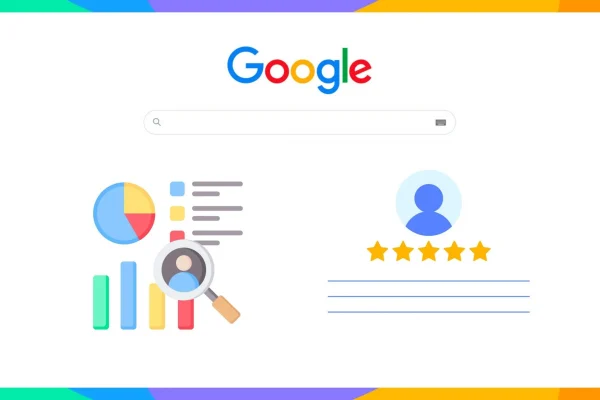Have you ever wondered how the quality of content on the internet is measured? What if I told you that there’s a Google framework specifically designed to assess this? Enter the concept of E-E-A-T, or Experience, Expertise, Authoritativeness, and Trustworthiness. This guideline is crucial for anyone looking to create impactful, people-first content.
What Is Google E-E-A-T?
Google E-E-A-T is an evolution of the E-A-T concept, used to assess the quality of content in search results.
The additional “E” stands for “Experience,” highlighting the importance of personal and practical experience of the content creator. This change reflects Google’s recognition that for some topics, such as product reviews or personal experiences, firsthand insights can be as valuable as formal technical knowledge.
E-E-A-T is important because Google wants to make sure it shows reliable and high-quality information in its search results. Websites and content that show a good mix of real-world experience, deep knowledge, recognized authority, and trustworthiness are more likely to appear higher in search results.
What Does E-E-A-T Stand For?
E-E-A-T stands for “Experience, Expertise, Authoritativeness, and Trustworthiness“. This set of criteria is used by Google to assess the quality of content on the internet. The components of E-E-A-T are crucial for determining how valuable and reliable a piece of content is:
- Experience: This measures the creator’s personal experience and direct knowledge of the topic, which adds depth and authenticity to the content.
- Expertise: This involves the creator’s qualifications and knowledge in a particular field, ensuring that the information is accurate and well-informed.
- Authoritativeness: This assesses the credibility of the creator and the content itself within its specific field, often influenced by the reputation among peers and audiences.
- Trustworthiness: This evaluates the integrity of the content, the accuracy of the information, and the security of the site, crucial for maintaining user trust.
These factors help Google prioritize high-quality, reliable content in its search results, providing users with a better and more secure browsing experience.
How Is E-E-A-T Different From E-A-T?
The addition of “Experience” in E-E-A-T, beyond just adding another letter, signifies a deeper emphasis on the practical knowledge and firsthand involvement that content creators have with their subject matter. This means that Google is recognizing and valuing the personal insights and real-world experience that creators bring to their content, alongside their formal expertise, credibility, and reliability.
In practical terms, this change allows Google’s algorithms to better appreciate content where personal experience can make the content more useful or relevant to readers. For instance, in areas like product reviews, personal finance, or health advice, the actual use and personal testing by the author can provide additional layers of trust and utility that purely theoretical knowledge might not convey.
This shift towards valuing experience aims to enrich the content ecosystem by highlighting not just what is known, but also how it is experienced by individuals, making the information presented not only informative but also relatable and practical.
Is E-E-A-T Just a Checklist?
While E-E-A-T might seem like a checklist at first glance, it’s much more nuanced and integral to building a trustworthy online presence.
Originally derived from Google’s Search Quality Evaluator Guidelines, E-E-A-T is a framework that helps ensure content not only reaches its target audience but also serves their needs effectively and safely.
Why Does E-E-A-T Matter?
E-E-A-T is vital for search engine optimization (SEO) and the creation of high-quality content, as these factors are employed by Google to evaluate the quality of websites and their content.
High E-E-A-T scores can lead to improved search rankings, which are essential for attracting organic traffic. Google prioritizes websites that demonstrate thorough expertise, authoritativeness, and trustworthiness, allowing them to appear more prominently in search results.
In competitive markets, high E-E-A-T can significantly set a site apart from its competitors. Websites with a reputation for expertise and authority tend to attract more quality backlinks and form valuable partnerships. They are also frequently cited as reliable sources within their industry, which can enhance their visibility and credibility.
Maintaining strong E-E-A-T also protects websites from being negatively impacted by Google’s algorithm updates, which frequently aim to penalize low-quality sites and reward those offering valuable, trustworthy content. High E-E-A-T scores ensure that a site maintains stable search rankings through these updates.
How Does E-E-A-T Affect Content Quality?
E-E-A-T significantly affects content quality by ensuring that the information presented is accurate, trustworthy, and delivered by credible sources. High E-E-A-T in content directly correlates to enhanced user trust and engagement, which are vital for a positive user experience and successful content outcomes.
Overall, high E-E-A-T leads to content that is not only more likely to satisfy user queries but also to foster a positive reputation and maintain a loyal audience base. This enhances the overall impact and effectiveness of the content, making it a valuable asset for any digital strategy.
The Role of E-E-A-T in Filtering AI-Generated Content
E-E-A-T is increasingly important in filtering AI-generated content because it emphasizes personal experience and expertise. AI lacks real-world experiences, so content solely produced by AI may not meet E-E-A-T standards for certain topics. Google uses E-E-A-T to ensure content is not only knowledgeable and trustworthy but also reflects genuine experiences that AI can’t replicate.
Google will continue to develop methods to prevent low-value AI content from ranking high in search engine results pages (SERPs). E-E-A-T is likely to be a significant tool in this effort. Additionally, Google probably uses feedback from Quality Raters to train its machine learning-based ranking systems and algorithms, helping to refine how content quality, including AI-generated content, is assessed.
The Core Elements of E-E-A-T
Let’s explore in detail each of the four components that constitute E-E-A-T.
Experience
When Google talks about “experience” in its E-E-A-T framework, it’s referring to actual, hands-on interaction with the topic being discussed in the content. This concept of experience adds a layer of authenticity and insight that is uniquely human and currently beyond the reach of AI-generated content. For example:
- A restaurant review is more authentic if it’s written by someone who has dined at the restaurant.
- A roundup of “top fitness apps” is more credible if it’s created by someone who has used each app in their workouts.
- A review of gardening tools is more reliable if the author has personally used them in their own garden.
Google’s Quality Rater Guidelines provide further clarity by indicating scenarios where personal experience is crucial and where it might be preferable to rely on expert opinions.
How To Gain and Demonstrate Experience?
Gaining and demonstrating experience in content creation, particularly in the context of Google’s E-E-A-T framework, involves actively engaging with the subjects you write about and showcasing your direct involvement. Here are practical ways to do this:
- Document Your Experiences: Use photos, videos, and detailed narratives to share your experiences. This documentation not only enhances your content but also serves as proof of your firsthand knowledge.
- Share Case Studies and Personal Projects: For more technical or specialized fields, share case studies or personal projects that demonstrate your involvement and expertise. This could be a home renovation project for a DIY blog or a coding project for a tech tutorial.
- Collect Testimonials and Feedback: If you provide a service, collecting and showcasing testimonials from clients can demonstrate your experience and credibility.
- Update Content Regularly: Show your ongoing commitment to a topic by updating your content with the latest information and your most recent experiences. This keeps your content current and relevant.
- Engage with Your Community: Participate in discussions, whether on social media, forums, or comments on your blog. Engaging with your audience shows that you’re active and invested in your niche.
Expertise
Google views expertise as an essential factor tied to the content creator’s background, including their formal education and practical skills acquisition. When assessing content, Google’s Quality Raters consider:
- The primary creator of the content
- The creator’s knowledge depth in the subject matter
- The creator’s recognition and reputation within the field
The significance of expertise varies depending on the content type and topic. For critical areas like finance or medicine, demonstrating expertise through credentials, academic achievements, and professional standing is crucial. This ensures the information aligns with the latest and most accurate consensus in these fields.
However, for less technical subjects, everyday skills and knowledge can also be recognized as expertise.
For a search on “Pasta Recipe” here are examples of how Google assesses expertise through the creators featured in the top positions:
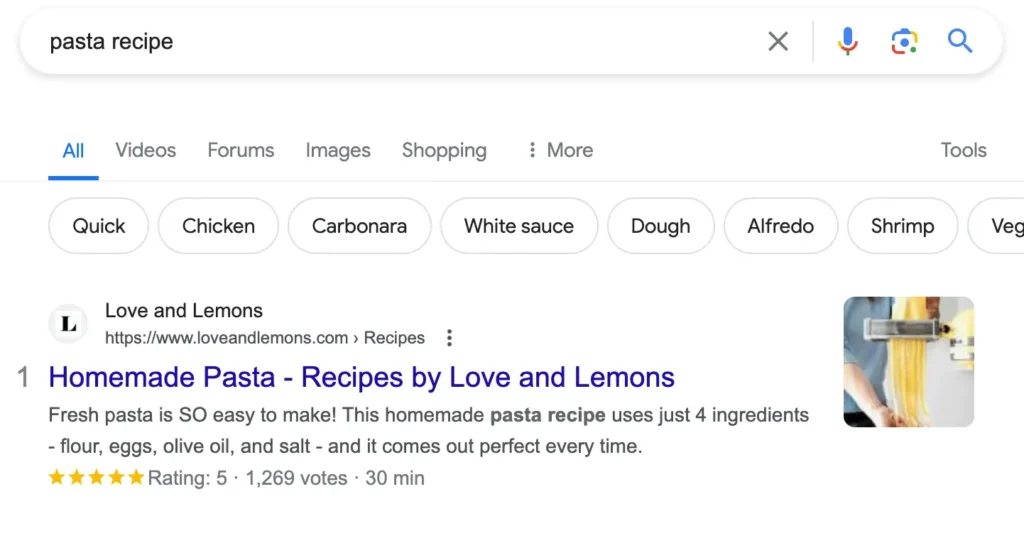
Position #1: Love and Lemons, run by Jeanine Donofrio, a cookbook author with a focus on simple and flavorful plant-based recipes. Her homemade pasta recipe showcases her culinary expertise, particularly in making complex dishes accessible to everyday cooks.
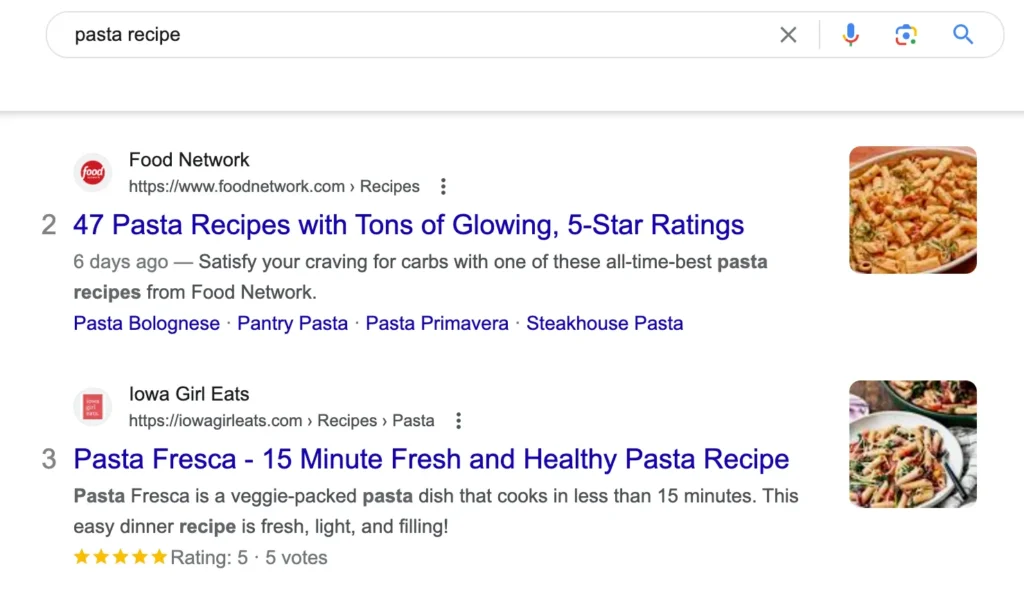
Position #2: Food Network features a collection of “47 Pasta Recipes with Tons of Glowing, 5-Star Ratings,” demonstrating their authority in the culinary field. Each recipe is developed by professional chefs and tested extensively, ensuring that users receive well-crafted and reliable cooking instructions.
Position #3: Iowa Girl Eats, created by Kristin Porter, who shares her passion for quick and healthy meals through her “Pasta Fresca” recipe. This dish reflects her expertise in creating nutritious, family-friendly meals that can be prepared in under 15 minutes, appealing to busy home cooks looking for fresh and light options.
Each of these pages is positioned in Google’s search results based on the specific type of culinary expertise they offer, meeting different user needs and preferences in the domain of pasta recipes. This demonstrates how Google uses the concept of expertise to ensure that search results deliver valuable, authoritative, and contextually appropriate content to users.
How To Build and Demonstrate Expertise
Building and demonstrating expertise is crucial for establishing authority in any field and enhancing the visibility and credibility of your content, especially in Google’s eyes. Here’s how you can do it effectively:
- Education and Training: Invest in formal education or training programs related to your field. Certifications, degrees, or professional courses can solidify your foundational knowledge and can be highlighted in your bio or profile.
- Continuous Learning: Stay updated with the latest developments in your field. Attend workshops, seminars, and industry conferences. Being current demonstrates ongoing commitment and expertise.
- Publish Quality Content: Regularly produce and share high-quality content that reflects your deep understanding of your subject. This could be through blogs, articles, podcasts, or videos. Quality content that helps solve common problems or provides new insights can establish you as a thought leader.
Authoritativeness
Authoritativeness is a critical component of Google’s E-E-A-T framework and plays a significant role in determining the credibility and influence of content creators and their content. It involves being recognized as a reliable source of information within a specific field or subject area.
For example, NASA is widely recognized as a leading authority in the field of space exploration and aeronautics.
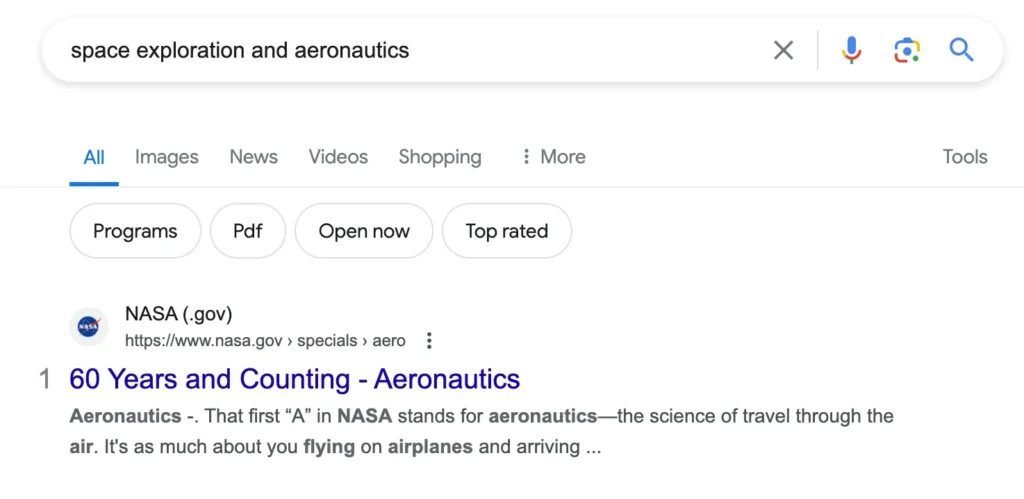
Similarly, IET – Institution of Engineering and Technology is universally acknowledged as a pinnacle authority in the fields of engineering and technology.
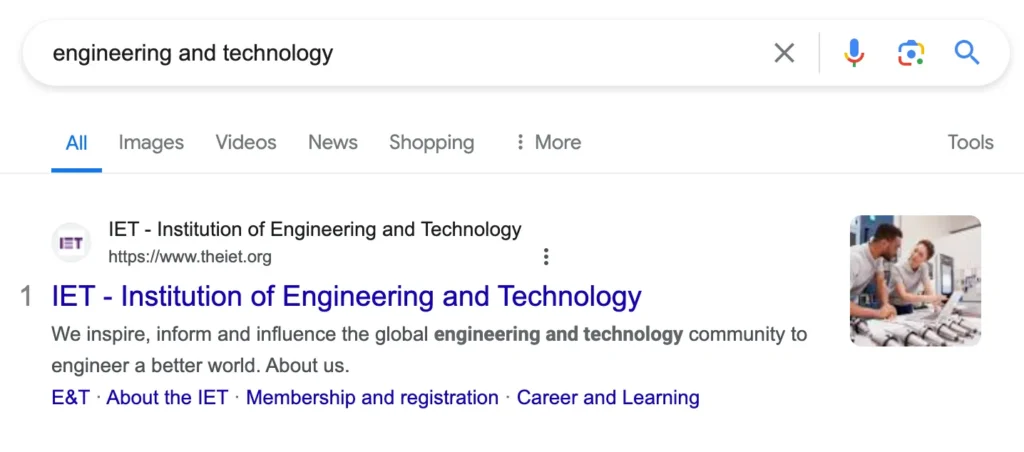
Why are these institutions held in such high regard?
When examining content from the Institution of Engineering and Technology (IET), you quickly notice the extensive expertise and rich experience that underscore their publications and findings. These qualities are manifest in several distinct features:
- Backlinks from other authoritative sites: The IET receives recognition and endorsement via links from reputable scientific and academic sources, further affirming their authority.
- A positive reputation: With a long history of contributions to the engineering and technology sectors, the IET is celebrated for its role in advancing these fields, reinforcing its status as a trustworthy source.
- Authors with strong personal brands or digital profiles as experts: Contributors to the IET often are leaders in their fields, encompassing a wide range of specializations from electrical engineering to renewable energy.
- Thorough content coverage: They provide in-depth and well-rounded information across a multitude of topics within engineering and technology, ensuring comprehensive coverage and insightful analysis.
Such clear examples underscore that authoritativeness in the IET is inherently linked to demonstrable expertise and a proven track record of experience. Without these elements, establishing authority in any field is significantly more challenging.
How To Build and Demonstrate Authoritativeness
Building and demonstrating authoritativeness in your field involves a strategic approach to establishing your credibility and influence. Here are practical steps to achieve this:
- Develop a Professional Online Presence: Create a well-designed website and maintain active profiles on relevant social media platforms. Your online presence should reflect your expertise and professionalism, providing clear information about your qualifications and experience.
- Get Published on Reputable Platforms: Contributing articles or research to well-known publications within your industry can significantly boost your authoritativeness. These platforms often have rigorous editorial standards and a large, engaged audience, which can lend credibility to your work.
- Network with Other Experts: Collaborate with other respected professionals in your field. This could be through joint ventures, guest posting on each other’s platforms, or co-authoring research papers. Such collaborations can enhance your credibility and extend your reach within the industry.
Trustworthiness
Trustworthiness is highlighted as the most pivotal factor in Google’s E-E-A-T framework. For Google, a trustworthy site is one that demonstrates accuracy, honesty, safety, and reliability.
The significance of trustworthiness varies depending on the content’s purpose. For example, a page offering financial advice holds a higher requirement for trustworthiness compared to a blog post about the best taco spots in LA. This is because financial guidance relies heavily on factual accuracy, and incorrect information could have serious repercussions for readers.
Trust is especially important for e-commerce websites where it’s crucial that users feel their financial transactions are safe. If a website does not use SSL (Secure Socket Layer) encryption or HTTPS (Hypertext Transfer Protocol Secure), users may not trust it to handle their transactions securely.
Tools like Semrush’s Site Audit can be used to assess a site’s security. Simply entering your domain and conducting an audit will review your site’s HTTPS implementation and overall security.
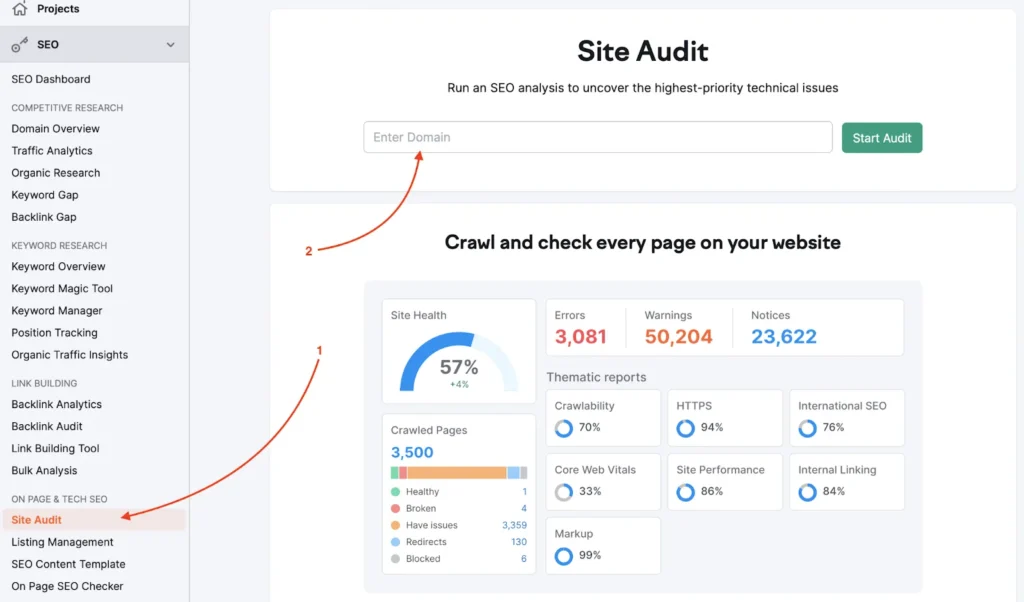
To reach the “Thematic Reports” section displayed in the screenshot from a Semrush Site Audit, follow these steps:
- Start the Site Audit: Go to the Semrush dashboard and navigate to the Site Audit section. Enter your domain in the search bar and click on “Start Audit.”
- Site Audit Settings: You will be taken to the “Site Audit Settings” menu. Here, you can adjust settings according to your preferences or proceed with the default settings by clicking on “Start Site Audit.”
- Audit Completion: Wait for the audit to complete. This may take a few minutes depending on the size of your site.
- View Audit Results: Once the audit is complete, you’ll see an overview of your site’s health score along with various metrics. Click on your project name to delve deeper into the results.
- Navigate to Thematic Reports: On the project details page, you will find different sections or widgets summarizing various aspects of your site’s performance. Look for the section labeled “Thematic Reports.”
- View Specific Reports: Within the “Thematic Reports” section, you can click on “View details” for individual reports like HTTPS, Crawlablity, Core Web Vitals, and others to explore detailed findings and recommendations for each aspect.
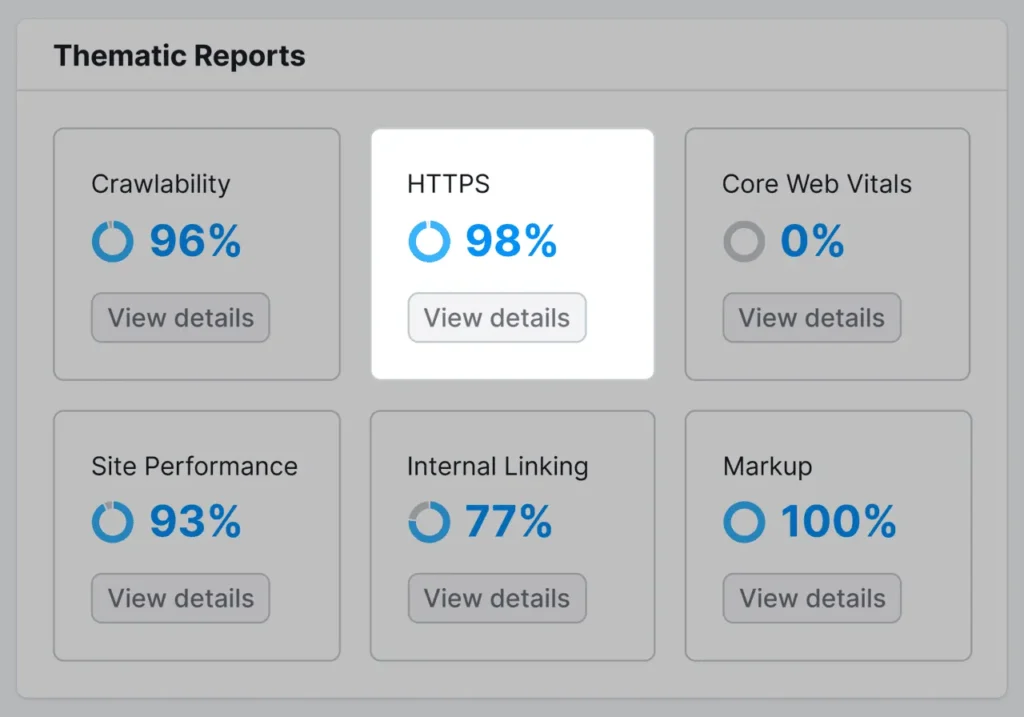
If issues are detected, the audit provides actionable insights on how to resolve them, ensuring your site maintains the highest standards of security.
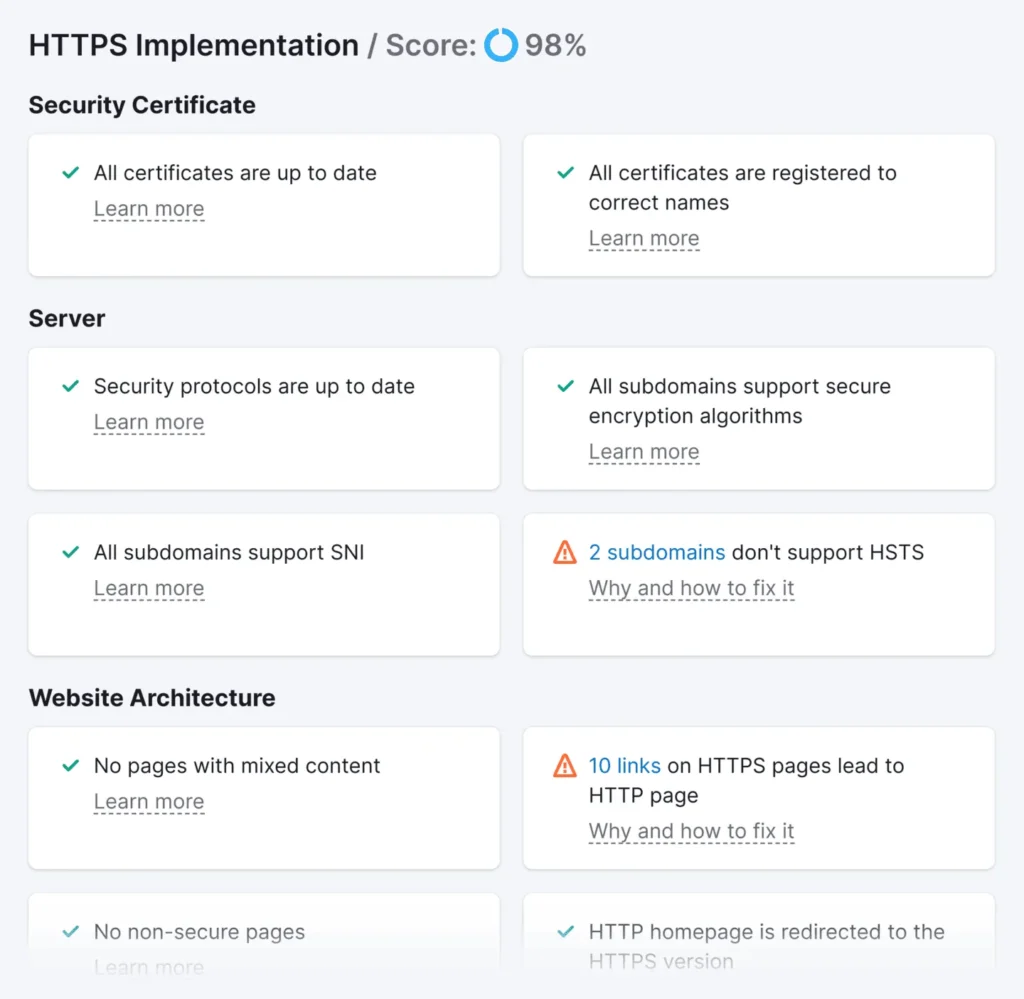
Common misconceptions about E-E-A-T
“E-E-A-T is Only Relevant for Medical and Financial Sites”
While E-E-A-T is crucial for “Your Money or Your Life” (YMYL) pages, which include medical, legal, and financial content, it’s a misconception that these criteria only apply to such content. Google uses E-E-A-T across all types of content to ensure that users receive reliable and trustworthy information.
“E-E-A-T is a Direct Ranking Factor”
Although crucial, E-E-A-T is not a direct ranking factor.
To clarify this, let’s consider its background. E-E-A-T evolved from the original E-A-T concept, which was first mentioned in Google’s Quality Rater Guidelines. According to Google:
“Raters evaluate how effectively content meets a search request, judging the quality of the results based on the expertise, authoritativeness, and trustworthiness of the content. While these ratings do not directly impact rankings, they help us benchmark the quality of our results and ensure they maintain a high standard globally.”
E-E-A-T does not function as a ranking factor in the traditional sense.
Instead, consider E-E-A-T a philosophy for crafting content that is genuinely helpful and centered around user needs. It’s about meeting the expectations of your visitors, which in turn, fosters trust in your website. This approach indirectly influences your site’s performance by aligning with the qualities that Google’s algorithms seek to promote.
“More Content Equals Higher E-E-A-T”
Some believe that simply producing more content can improve a site’s E-E-A-T scores. However, quality, accuracy, and the presentation of trustworthy information are more important than quantity. High E-E-A-T requires content that genuinely reflects expertise, authoritativeness, and trustworthiness, along with relevant experience.
“E-E-A-T is Only About Textual Content”
E-E-A-T applies not only to textual content but also to videos, images, and other forms of media. The credibility and quality of all content types are assessed under these criteria to ensure they meet Google’s standards for providing value and trust to users.
“Small or New Websites Can’t Have Good E-E-A-T”
It’s a myth that only large or established sites can score well on E-E-A-T. New or small websites can also demonstrate high E-E-A-T by providing high-quality, well-researched content that aligns with Google’s guidelines. Author credentials, clear sourcing, and transparent site ownership are key factors that can boost E-E-A-T regardless of the site’s size.
Reasons E-E-A-T matters for content creators
5 Practical Ways to Build and Demonstrate E-E-A-T
Here are 5 practical ways to enhance your site’s reputation and ensure it aligns with Google’s E-E-A-T criteria:
1. Expanding Your Reach Beyond Your Own Platform and Traditional Content
While it’s common to rely primarily on written content on your own website to showcase your experience and expertise, it’s crucial to view E-E-A-T as more than just an SEO strategy—it’s a comprehensive approach to building your reputation. To effectively broaden your influence and have others vouch for your credibility, consider engaging in the following activities:
- Participate as a guest on podcasts that align with your expertise.
- Collaborate with industry peers to co-host educational webinars.
- Accept speaking engagements at relevant industry conferences.
2. Leveraging Schema Markup to Enhance E-E-A-T
Utilizing schema markup on your website can significantly boost your content’s visibility to search engines and improve its representation in search results.
By structuring your data effectively, schema markup helps communicate the context of your content directly to search engines, which can aid in demonstrating your expertise, authoritativeness, and trustworthiness.
Example of Schema Markup that Helps Enhance E-E-A-T:
Author Schema Markup: This type of schema is particularly useful for demonstrating expertise and authoritativeness. By implementing Author Schema, you can link the content directly to its creator, providing details such as the author’s name, biography, and relevant qualifications.
3. Enhancing Your “About Us” Page
An effective “About Us” page should serve not only as a narrative but also as a strategic component of your website’s overall branding and SEO efforts. Here’s a breakdown of how you might enhance your About Us page:
- Tell Your Story: Clearly articulate how your company started, its mission, and the problems it aims to solve. Highlight your journey, key milestones, and what sets you apart from the competition.
- Showcase Your Values and Culture: Discuss your company values and culture. This is your opportunity to connect with your audience on an emotional level, showing why you do what you do and what beliefs guide your business practices.
- Highlight Achievements and Expertise: Include any awards, certifications, notable achievements, or media mentions to build credibility. Demonstrating your industry recognition and expertise can significantly boost your authoritativeness and trustworthiness.
- SEO Optimization: Use relevant keywords naturally throughout your “About Us” page to help improve its visibility in search results. However, ensure the text remains natural and engaging.
4. Demonstrating Basic Business Trust Factors
When developing a business website, it is crucial not to overlook the basic elements that visitors expect to see. These components are more than just simple webpage additions; some are even legal requirements. Including a terms and conditions page, privacy policy, cookie policy, returns policy, and delivery information not only meets these expectations but also builds foundational trust.
Would you trust an e-commerce site without a clear returns policy or transparent delivery information? Probably not. While having these policies in place doesn’t necessarily set you apart from the competition, the absence of these basic business trust factors can significantly undermine credibility, suggesting potential fraudulence or unreliability.
5. Keep Your Content Updated
Pages that have not been updated for a while are likely to contain information that is either old or no longer accurate.
To ensure your website remains a reliable resource, it’s essential to regularly evaluate and update your content as developments occur in your field. A good rule of thumb is to review content at least once a year, though doing so every six months is ideal.
Beyond just making updates, it’s also important to communicate these changes to your audience. Clearly indicate on your site when the content was last revised. This practice not only maintains transparency but also reinforces the trustworthiness of your content to users.
Maximize Your Site’s Impact with Index365
Enhance your website’s effectiveness and authority by creating content that truly matters. Join forces with Index365 to master the principles of Google E-E-A-T and put your audience first. Discover our tailored content and SEO services at index365 and start making a significant difference in your digital presence! Contact us now!
